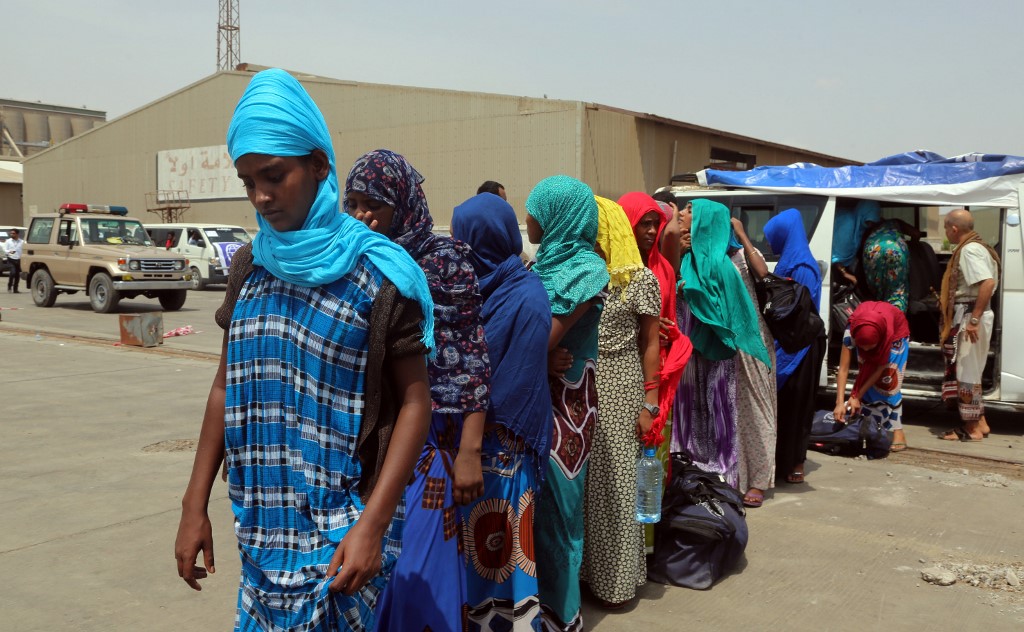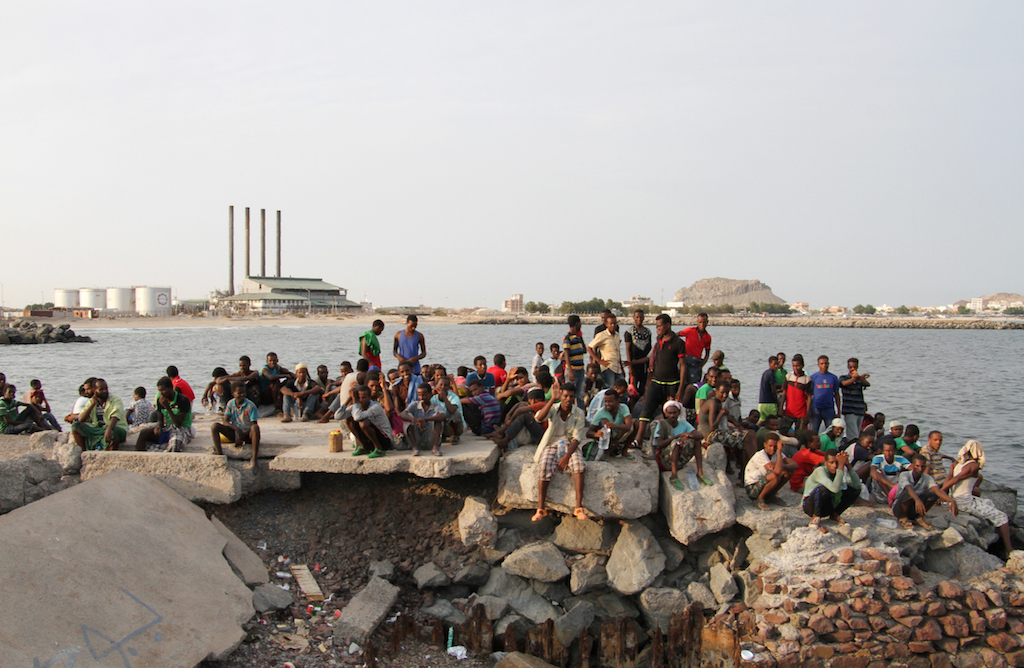Zahrah Mohamed arrived in Lahj province in the middle of April, along with more than 70 Ethiopian refugees, after a journey from her home country to Djibouti and then a four-day sea journey with smugglers to the Yemeni port city of Aden.
“We fled our home for the sake of better life but we found it worse and we do not know what we are going to face in coming months,” she said.
'We fled our home for the sake of better life but we found it worse'
- Zahrah Mohamed, Ethiopian refugee in Yemen
The authorities arrested Mohamed, an Ethiopian refugee woman in her 30s, with a dozen other refugees between the provinces of Lahj and Taiz while they were walking on foot and imprisoned them in the Public Compound of Taiz’s Al-Shimayateen district.
Yemeni authorities have kept arrested refugees inside sport stadiums, military camps and sometimes in the yard of public institutions under the direct heat of the sun.
The International Organization for Migration (IOM) has expressed its alarm at reports of migrants dying of preventable illnesses, being shot and suffering other inhumane treatment in makeshift detention centres in Yemen.
On Tuesday, the UN agency called for the release of more than 3,000 migrants, mostly Ethiopians, held in two detention centres in southern Yemen.
"Some 3,000 migrants continue to be held in two temporary detention sites in Yemen's Aden and Abyan governorates," IOM spokesman Joel Millman told a news briefing in Geneva.
The majority of Ethiopians travelling to Yemen - as many as 98 percent in 2016 according to the Mixed Migration Centre - belong to the Oromo minority, who are majority Muslim and have long faced persecution and intense poverty in Ethiopia.
“We have been suffering from hunger in Ethiopia and we fled to Djibouti. There I learnt Arabic language and then we were smuggled on a boat to Yemen,” she added.
“I arrived to Yemen four days ago and we have been walking for four days until we arrived to this area that we do not know.”

Zahrah hardly speaks Arabic while most of the other refugees cannot speak Arabic at all, depending on people like Zahrah to translate for them. On top of that, they have no food and only a bottle of water on their backs.
"Water is the most important for us as we walk all the day under the sun's rays - some generous people help us with food on our way and at night we sleep anywhere. We prefer places near to residential areas which are safe.”
The situation for Zahrah and her colleagues is worsening in the Public Compound without food and no one to help them.
“When we were outside the prison, generous people helped us with food but now no one," she explained.
“We are Muslims and we fled our houses after our conditions worsened. We hope that organisations and generous people help us.”
Destination: Saudi Arabia
Zahrah and her colleagues know the situation in Yemen and do not plan to stay here. Their main hope is to pass through and reach Saudi Arabia.
“Our destination is Saudi Arabia where many Ethiopians have already arrived through Yemen. It is easy to get to Yemen, but it is difficult to arrive in Saudi,” she added.
“However if we find proper work in Yemen we will stay - we have families in Ethiopia and we need to pay for them.”
Another refugee in the same compound - who spoke neither English nor Arabic - said that he had not known the other refugees in the compound until he met them in the boat.
“We belong to different areas in Ethiopia but suffering gathered us in the same journey to Yemen and we decided to go together until we arrive to Saudi Arabia,” he told MEE, with help from Zahrah.
During the journey from Djibouti to Yemen, the refugees faced difficult situations as the smugglers forced them to swim for several kilometres in the sea to avoid being captured by Yemeni authorities.
Many refugees did not make it.
“Those who cannot swim very well, they die in the sea, so before starting the journey the smugglers tell people who cannot swim not to leave Djibouti.”
It is not only Ethiopians who are trying to flee Yemen. Yemenis themselves are trying to leave the war-torn country for Saudi Arabia through smuggler routes. Although the journey is unsafe, desperate people risk their lives to make it.
Cholera among refugees
Some refugees in the compound are suffering from acute water diarrhoea (AWD) and only severe cases received healthcare, according to Zahrah.
“Three people here suffer from cholera and only one was taken to hospital while others did not receive healthcare,” she said.
“What we need is food and healthcare until they free us to complete our journey in looking for work.”







